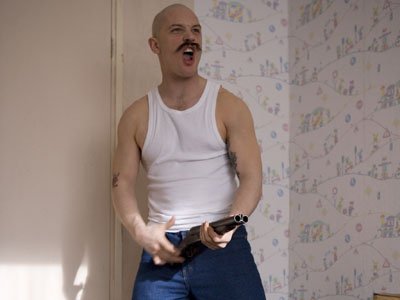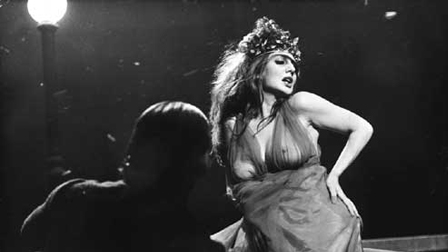The Cleveland Institute of Art Cinematheque is showing several great movies this weekend. Here are our reviews of just a few of them.
Bronson (Britain, 2008) “I came into the world as Michael Peterson, but I come out with my fighting name, Charlie Bronson,” the bad-tempered brawler (played by Tom Hardy in a virtuoso performance) tells the camera early in this spunky movie about the real-life convict. And he’s indeed a fighter. The first several minutes of
Bronson consist of scuffles with schoolmates, teachers, police officers — pretty much anyone within his fists’ reach. “Prison was a place where I could sharpen my tools, hone my skills,” he says at one point. “It’s like a battleground, an opportunity.” Hardy is terrific, skirting Bronson’s line between psychotic and being in complete control of his actions. He’s charming, funny and downright terrifying as a man who’s shuttled between prisons, in and out of prison, and eventually to the crazy house. Director Nicolas Winding Refn literally lets Hardy roll with the punches, pulling him along with quick edits, some extreme close-ups and a few fancy camera moves. Mostly, though, he unleashes his star and allows him to roam. At 7:20 p.m. Saturday, Dec. 19, and 8:25 p.m. Sunday, Dec. 20. *** (Michael Gallucci)
Fellini's Roma (Italy/France, 1972) In this 1972 scripted film without plot or characters, Federico Fellini plunges into an evocation of Rome through disconnected and surreal vignettes, Nino Rota music and cinematic buffoonery ladled out with a heavy hand. Rome’s crowded, crazy tenements of the fascist ’30s are shown from the point of view of a newcomer from Italy’s cultured north. Then there’s a flash-ahead to Fellini himself and his camera crew in oddly futile modern-day exploits, shooting (or not) a vaudeville sequence that seems to oscillate between WWII and the Vietnam era. There are dramatized comparisons of upper- and lower-class brothels, an interview with Gore Vidal and a brush-off from Anna Magnani. There’s even a visit to an aged aristocrat, which cues a gaudy parade of clergy in a “Vatican Fashion Show.” It recalls anti-Catholic iconoclast Luis Buñuel, who at the time was also making anarchic — but brilliantly composed and fiendishly entertaining — anti-narratives like The Phantom of Liberty and The Discreet Charm of the Bourgeoisie. Fellini’s film, by contrast, just seems to be thrashing around in search of cohesion, mostly in vain. At 9:25 p.m. Saturday, Dec. 12, and 6:30 p.m. Sunday, Dec. 13. ** (Charles Cassady Jr.)



